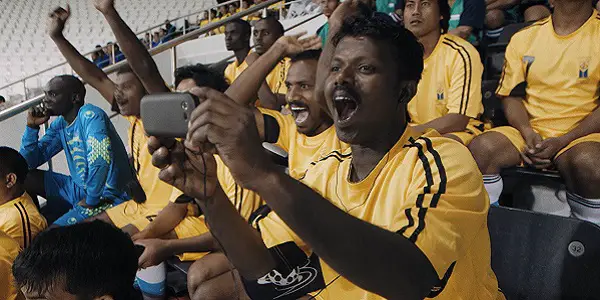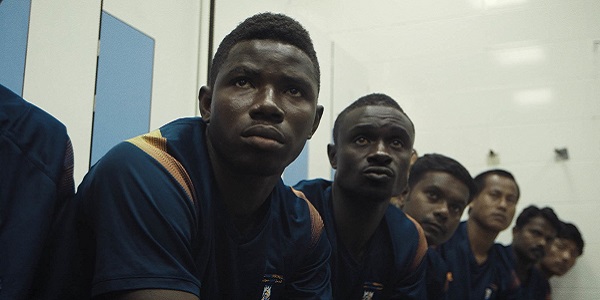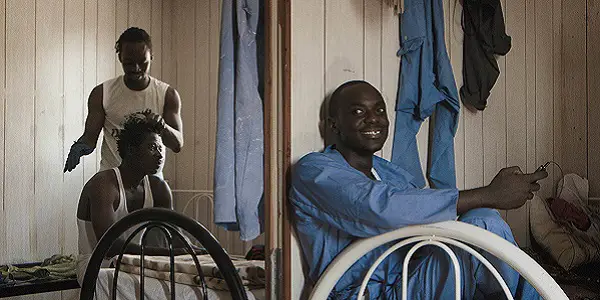Interview With Adam Sobel, Director Of THE WORKERS CUP: “You Find Great Inequity Everywhere In The World”

Lee Jutton has directed short films starring a killer toaster,…
World Cup fever is in full swing as the world prepares to watch host nation Russia square off with Saudi Arabia in the tournament’s opening match on Thursday, June 14. But amid all of the excitement over Nigeria’s super-cool jerseys and Iceland’s underdog hopes, a film has been released that shines a light on the dark underbelly of the World Cup.
The Workers Cup brings audiences inside the labor camps filled with migrant workers who are constructing infrastructure for the 2022 World Cup in Qatar. These men work long hours for little pay far from home, in camps that are positioned outside the city limits and away from the residential areas by law. They are literally segregated from wealthy Qatari society while building the facilities for them to watch the 2022 World Cup in.
In order to distract watchful eyes around the world from any human rights abuses going on in the camps, the committee that organized Qatar’s World Cup bid decided to organize a soccer tournament in which these migrant workers could compete against each other. The Workers Cup follows one of these teams of workers, from a construction company called GCC, and allows us an intimate glimpse into their lonely days in the camp and their glorious nights on the pitch.
I recently spoke with Adam Sobel, director of The Workers Cup, about how he and his crew managed to gain such access in a country notorious for its lack of media freedom, what it was like on gameday during the tournament, and what ordinary people around the world can do to help the migrant workers in Qatar.

Lee Jutton for Film Inquiry: How did you find out about the Workers Cup, and what made you decide it would be a good topic for a film?
Adam Sobel: I actually lived in Qatar in 2011, which was a year after they won the right to host the 2022 World Cup. Once I got there, I started working for a production company with Ramzy Haddad and Rosie Garthwaite, the producers of the film. We were doing news and documentaries across the region, and whenever we were hired to do stories in Qatar it was always stories about the migrants, for outlets like HBO, CNN, and the BBC. This is a very sensitive topic.
Qatar is a country without much in the way of media freedom; we often had to hide peoples’ identities or work undercover. The workers themselves were often portrayed as victims or resources but not much else, and we were trying to find a way to approach it on the terms of the workers. How do you do that in a country where you don’t have that kind of access? The tournament was the key to unlocking the access.
While watching the film I was amazed at the kind of access you had. It didn’t seem usual for a country like Qatar.
Adam Sobel: The tournament was organized by the same committee that organized the bid for the World Cup, Qatar’s Supreme Committee for Delivery & Legacy. We knew two things. One, the Supreme Committee has been widely criticized for their treatment of migrant workers – and not just their treatment, but the country’s treatment of migrants leading up the World Cup. We knew there was an angle for them to show, “Hey, we take this tournament seriously, we care about those workers.”
And I want to point out, just because a system is caring and unjust, doesn’t mean that everyone who works within that system is a bad person. Because we lived there, we knew enough people who wanted to change the system but didn’t feel empowered to do it. Through our film, they saw a way to have their opinions expressed, even if only through the characters in the film. So the access we got was unprecedented for Qatar.
Were you a soccer fan before you decided to make the film?
Adam Sobel: Yeah, I grew up playing soccer and I loved the game. And my now-wife, then-girlfriend, moved to Qatar in 2010 and I think they won the right to host about a month or two after she got there. All of a sudden everyone was talking about Qatar. This country that was in many ways off people’s radar popped. That’s why the Qataris really wanted to host the World Cup – it really positioned them on the world stage. But an unintended consequence of that was the attention on the workers.

For those who may be unfamiliar with what is going on in Qatar in the lead-up to the World Cup, could you give us a brief bit of background into the labor camps and what life is like inside?
Adam Sobel: 60% of the population in Qatar is these blue-collar migrant workers responsible for construction, not just for the World Cup but throughout the country. The stadiums are just a drop in the bucket of the overall construction of infrastructure for the country – it’s a total facelift for the country. Workers live in labor camps. By regulation, the country has certain areas zoned as residential areas – usually the urban areas – and labor camps cannot be in residential areas. So by being a worker you are already segregated and separated from society.
As soon as you visit Qatar, or if you live there, you’re immediately aware of the presence of migrant workers. You see them passing on the bus or on the side of the road working, or on a construction site. But there’s really no chance that you’ll have a meaningful dialogue with them. They are, by design, out of sight, out of mind.
What made you land on GCC as the company team to follow in the film?
Adam Sobel: We went around to the different companies that were competing in the tournament. Each one is bidding for World Cup projects, so they’re signed to a human rights charter that holds you to a higher standard than the laws of the country. So by law, if you’re bidding for World Cup projects, you should be treating workers better than the rest of the country.
So we went around, and some outright said they weren’t interested, but some said they were. Originally, I wanted to do a panorama where I followed one player from a bunch of different teams, but GCC had this energy, this spark about them. They were really gung-ho about the tournament. The players took it so seriously and put so much hope into it.
And they had this really interesting multiethnic makeup to the team – players from Nepal, India, Kenya, Ghana, and the coach was Arabic. That was really interesting because in Qatar, migrant workers are normally segregated by nationality in the labor camps – and it’s not just self-segregation, certain areas for the camps are marked for the Nepalis, the Bangladeshis, the Africans. And I was curious to see what it would look like to see these guys come together for this tournament because that’s an opportunity that they wouldn’t otherwise get outside of this tournament.
There were some great characters in the group. I was particularly attached to Kenneth. His entire story about getting tricked by his agent into coming to Qatar was so sad, but to see him take charge as captain of the team and do things like bargain for training time for the team was truly remarkable.
Adam Sobel: Yeah, that was so bold. That was brave of him. It’s easy to kind of overlook that if you’re seeing it through the prism of a white collar individual, but that was such a brave moment for him. I thought Kenneth was such a great leader for the team. And that’s part of what drew us to GCC, to find someone like him who saw the tournament as a literal escape. I had thought of it as a metaphorical escape, from the daily grind, but Kenneth saw it as a potential escape from the camps entirely.
What was the most shocking thing you witnessed in the camps while shooting the film?
Adam Sobel: When we started making this film, I think we expected it to be more about the big headlines around the issues because those had already been in the media. But when we met the characters, we tried to let them lead the content as much as possible and to follow their lead. So, what I found shocking were the everyday dignities that they were really craving, and how that was what was demoralizing them.
That abject loneliness was so pervasive. You’re sitting with 900 coworkers but it is a lonely, lonely existence. You’re not allowed to bring your family, you’re not part of society, and you’re seen as a resource by the people who live there. How insidious that loneliness and isolation were was really surprising and shocking to me. That was what stuck with me, this basic dignity they were asking for.

That really struck me, the way these men were being treated like slaves but were still struggling to hold onto their dignity and their humanity. And then, to see them celebrate a goal during one of their games as though they had just won the actual World Cup was so inspiring. What was the game day experience like?
Adam Sobel: It was electric. Absolutely electric. It’s not on the scale of the World Cup, but I’d say the emotions were pumping just as high for these guys. The tournament became everything for them, they were living for it. During the tournament that was what was keeping them going – feeling a sense of participation in something and having a chance at glory. That meant so much to them.
And that was really interesting as a storyteller because it contrasted so much with the loneliness and the psychological duress they were under when the games weren’t going on. The tournament was a rollercoaster of emotions for them, and when it ended the rug was pulled out from under them. The cold hard reality was waiting for them.
Yeah, another thing that really struck me was how, as you mentioned, they were a multiethnic group of guys, but it wasn’t until they were knocked out of the tournament that you started to see the tensions between the different groups. The Africans accused the Nepalis of insulting the color of their skin, while the Nepalis accused the Africans of not giving them enough playing time because they were not African.
Adam Sobel: That tension was always there, bubbling under the surface, but when you’re winning it’s easy to cross over those things and feel good about yourself. But as soon as you lose, those things bubble over.
We were at a screening recently and there were some World Cup winners there, and I don’t want to say who it was, but he was on a World Cup-winning team, a person for color playing for a European squad, and he said the exact same thing happened to him in a professional locker room. When you’re winning people make these jokes, and you let it slide, but when you’re losing, it’s not funny anymore.
Have you been keeping in touch with the workers from the film?
Adam Sobel: We’re in contact with the guys, some more than others, but we’ve spoken to all of them recently. Kenneth is back in Ghana trying to play football. He had a tryout for a semi-professional club in Ghana recently – I think it was Monday, so really recently. I don’t know, Kenneth still has this dream and he is pursuing it, but he is still vulnerable. The situation that brought him to Qatar…he’s still mingling with those agents. But this tryout was for a club in Ghana, so that’s good.
Some people are still in the camp, in the exact same situation. Some guys have gone home since filming. And then there are still some, like Padam, who went home to his wife and now he’s returned to the Gulf, and he’s working in Dubai. And that’s part of the theme of this film, there’s this cycle where people who are in vulnerable positions are easily taken advantage of again and again.
They all saw the film before it premiered anywhere, and our one guiding principle was to create something that they’d be proud of.
Were they all happy with the film?
Adam Sobel: Yeah, except for when they had to relive the penalty shootout. Or they’d say the usual things like, “Wait, we shot for so long but my part is only 10 minutes long, what happened?”
Truthfully, I think they were very happy with the film but that it was also very uncomfortable for them to watch. That rollercoaster of emotions makes it difficult. But several of the guys came up to me afterward and said it felt like they had expressed their truths.
That’s wonderful. I’m sure many people will watch this film and want to know if there is any way they can help migrant workers like the men in the film. Can you recommend the best ways for them to do so, even from so many miles away?
Adam Sobel: This is always a difficult question to answer, but this labor system that exists in Qatar did not begin when they won the right to host the World Cup; it has been going on for decades, and across the Middle East. The difference is that nobody talked about it or cared about it. So now there’s a lot of pressure on the country to improve the conditions of migrant workers. I think that’s a really positive thing, but I think that once that World Cup comes and goes I think that window for change closes.
So, for the next four and a half years, I think people need to reflect on how their support for an event of an event like the World Cup makes them complicit in the treatment of these migrant workers. And if you feel complicit, express your opinion to football associations. Write to U.S. Soccer, write to FIFA, write to the sponsors of the World Cup and say you don’t want to support an event that makes migrant workers more vulnerable.
I think that’s the most practical thing people can do, but I’d also ask people to reflect on the inequity that exists closer to home. This is a film about Qatar and the World Cup, but you find great inequity everywhere in the world.
The Workers Cup was released in theaters in New York and Los Angeles on June 8, 2018. You can find more screening dates here.
Does content like this matter to you?
Become a Member and support film journalism. Unlock access to all of Film Inquiry`s great articles. Join a community of like-minded readers who are passionate about cinema - get access to our private members Network, give back to independent filmmakers, and more.
Lee Jutton has directed short films starring a killer toaster, a killer Christmas tree, and a not-killer leopard. Her writing has appeared in publications such as Film School Rejects, Bitch: A Feminist Response to Pop Culture, Bitch Flicks, TV Fanatic, and Just Press Play. When not watching, making, or writing about films, she can usually be found on Twitter obsessing over soccer, BTS, and her cat.













